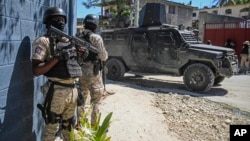A gang near Haiti's capital ambushed and killed three police officers on Sunday in the latest attack against an under-resourced and underfunded police department that has reported nearly two dozen officers slain so far this year, according to authorities.
The killings occurred in Thomassin, a largely upper-class neighborhood just south of the capital of Port-au-Prince that is controlled by a gang called "Ti Makak," which translates to "Little Macaques."
The details of the killings were provided by an officer who survived the attack, according to the National Union of Haitian Police Officers, which said it was saddened by the news.
Haitian Prime Minister Ariel Henry condemned the killings and extended his condolences.
"Our police brothers have today, once again, fallen under the murderous bullets of lawless thugs. We deplore these barbaric acts," he tweeted.
He added that his government is doing everything possible to create a climate of security and stability "in a country too bruised and bereaved."
At least 21 police officers have been killed so far this year as gangs continue to fight over territory and grow more powerful since the July 2021 assassination of President Jovenel Moïse.
The Ti Makak gang also was blamed for killing another three officers in September in nearby Laboule. In addition, two journalists were fatally shot and set on fire in that area last year, as well as a former senator and his nephew.
In October, Haitian Prime Minister Ariel Henry and other top officials requested the immediate deployment of foreign troops to help fight relentless gangs, but so far, the U.N. Security Council, along with the U.S. and Canada, have opted to impose sanctions. The international community also has provided equipment, training and other resources for Haiti's National Police.
As of mid-March, gangs were blamed for killing at least 531 people and kidnapping 277 others in the capital of Port-au-Prince and nearby areas. Another 160,000 people in the country of more than 11 million people have been displaced by violence, according to the U.N.
"Chronic instability and gang violence have contributed to surging prices and food insecurity. Half of the population does not have enough to eat," the U.N.'s Human Rights Office of the High Commissioner warned last month. "We are gravely concerned that extreme violence continues to spiral out of control in Haiti."
The U.N. estimates that gangs now control up to 80% of Port-au-Prince and surrounding areas.








